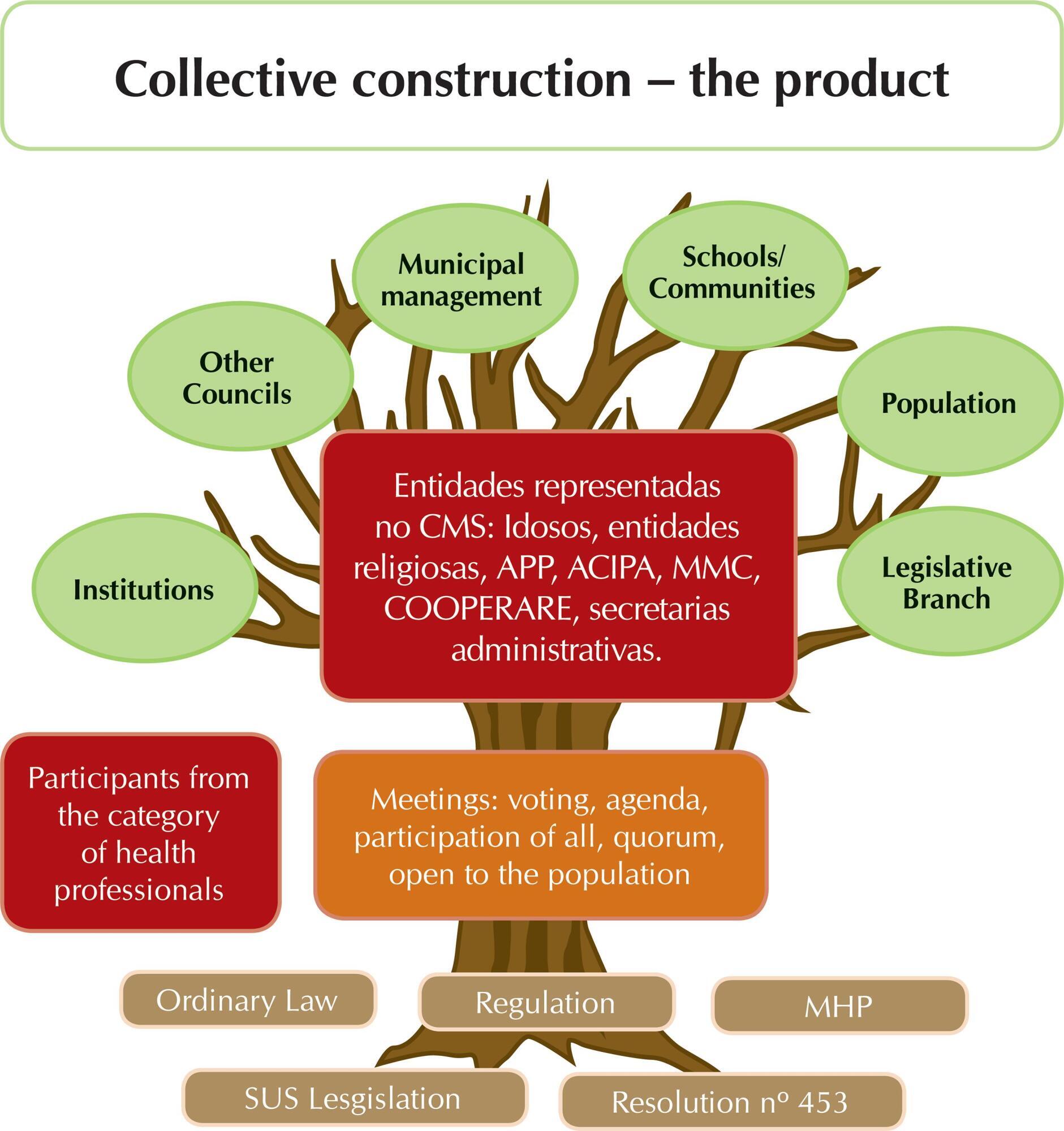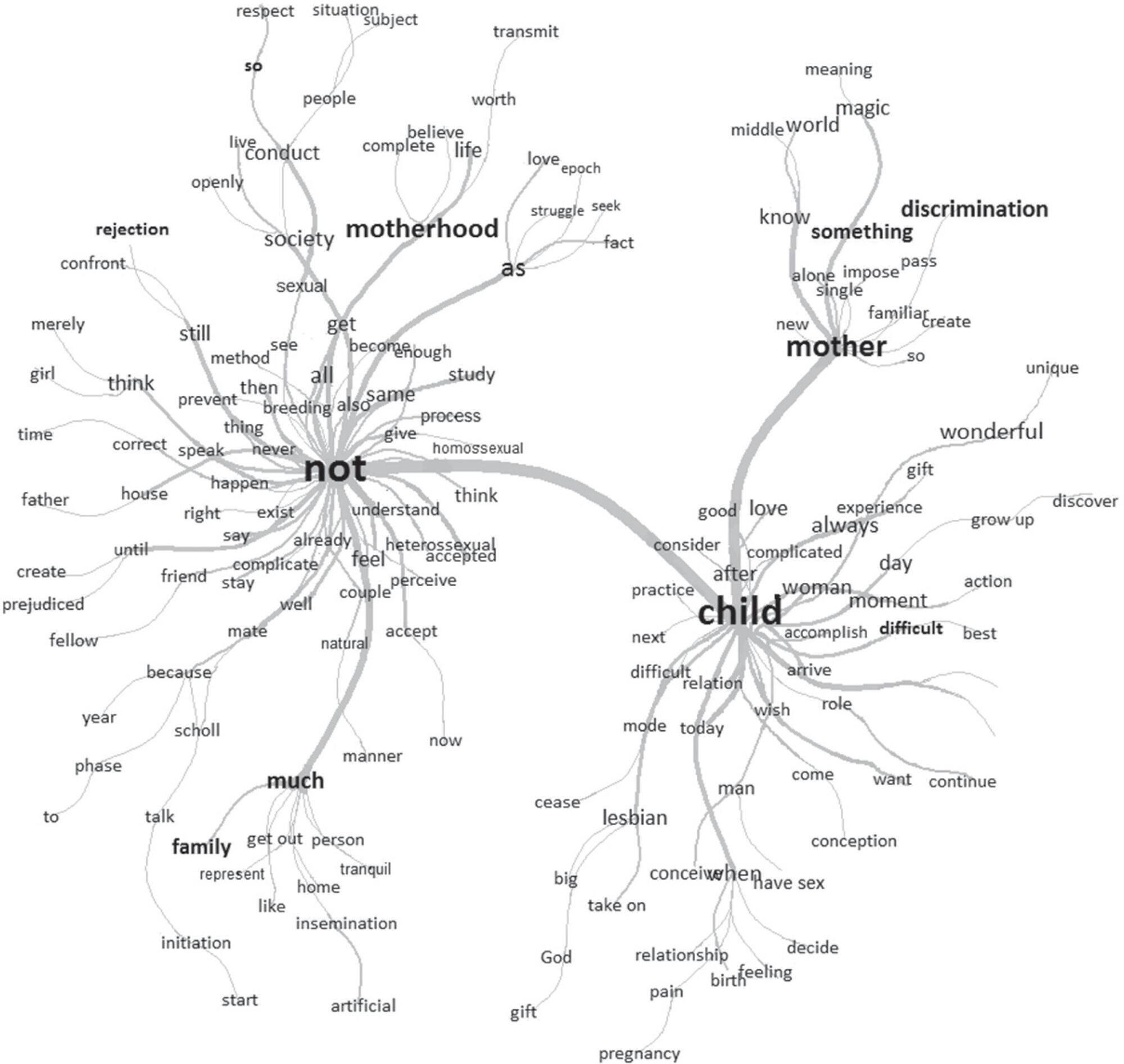-
RESEARCH01-01-2018
Quality of life of elderly people living with HIV/AIDS in outpatient follow-up
Revista Brasileira de Enfermagem. 2018;71:513-522
Abstract
RESEARCHQuality of life of elderly people living with HIV/AIDS in outpatient follow-up
Revista Brasileira de Enfermagem. 2018;71:513-522
DOI 10.1590/0034-7167-2017-0127
Views0See moreABSTRACT
Objective:
To analyze factors related to the quality of life of elderly people living with HIV/AIDS.
Method:
A cross-sectional study was carried out with people aged 50 years or more in a specialized outpatient clinic. The data collection was by means of an interview. For the analysis of data and characterization of the sample, descriptive statistics and comparison tests were used. The project met the ethical requirements.
Results:
Participants were 81 users aged 50 to 75 years, mean age was 57.8 (± 6.1) years, 71.6% of whom were men. There was a statistically significant relationship with the quality of life, the following variables: gender, children, occupation, religion, diagnosis time, HIV exposure, adverse effects, treatment interruption, viral load counts, hospitalization, dependence for daily activities and use of drugs.
Conclusion:
The results suggest that the quality of life deficit is related not only to physical changes, but to the anguish and stigma related to HIV/AIDS.
-
RESEARCH01-01-2018
Alcohol consumption, Quality of Life and Brief Intervention among Nursing university students
Revista Brasileira de Enfermagem. 2018;71:505-512
Abstract
RESEARCHAlcohol consumption, Quality of Life and Brief Intervention among Nursing university students
Revista Brasileira de Enfermagem. 2018;71:505-512
DOI 10.1590/0034-7167-2017-0692
Views0See moreABSTRACT
Objective:
To evaluate nursing university students’ alcohol consumption patterns, Brief Intervention and Quality of Life (QoL).
Method:
This is a prospective and longitudinal study containing sociodemographic, economic information concerning alcoholic beverages, BI and QoL evaluation among 281 nursing university students. Since surveys have been applied, seminars have been given and consumption patterns have been discussed, an educational material was delivered after university students’ revaluation and BI reinforcement. Descriptive and analytical statistics have been conducted.
Results:
90% of the students have already consumed alcohol and 20.6% that consumed for the first time and abused alcohol were minors. After the implementation of BI, the alcohol consumption has decreased among university students. Besides the vitality, generate state of health, and emotional aspects have decreased, mental health was substantially low among the students that used to drink.
Conclusion:
BI contributes to decrease alcoholic beverages consumption and promotes health.
-
RESEARCH01-01-2018
Wellness room as a strategy to reduce occupational stress: quasi-experimental study
Revista Brasileira de Enfermagem. 2018;71:483-489
Abstract
RESEARCHWellness room as a strategy to reduce occupational stress: quasi-experimental study
Revista Brasileira de Enfermagem. 2018;71:483-489
DOI 10.1590/0034-7167-2017-0572
Views0See moreABSTRACT
Objective:
To compare occupational stress levels of nurse staff working in the surgical unit before and after the intervention “wellness room”.
Method:
Quasi-experimental study with a sample of 60 nurse staff working in a surgical unit of a teaching hospital in the Southern Region of Brazil. The intervention was conducted in a room in the workplace for six months and consisted of sections of aesthetic care, relaxation, lectures and workshops to reduce occupational stress. Data were collected through the Demand-Control-Support Questionnaire before and after the intervention, and the comparative analysis was performed by the Wilcoxon test.
Results:
After the intervention, there was a decrease in demand and an increase in control and in the social support received at work in all professional categories, but the differences were not statistically significant.
Conclusion:
The intervention “wellness room” reduced occupational stress levels in the sample studied; however, it was not a significant decrease.
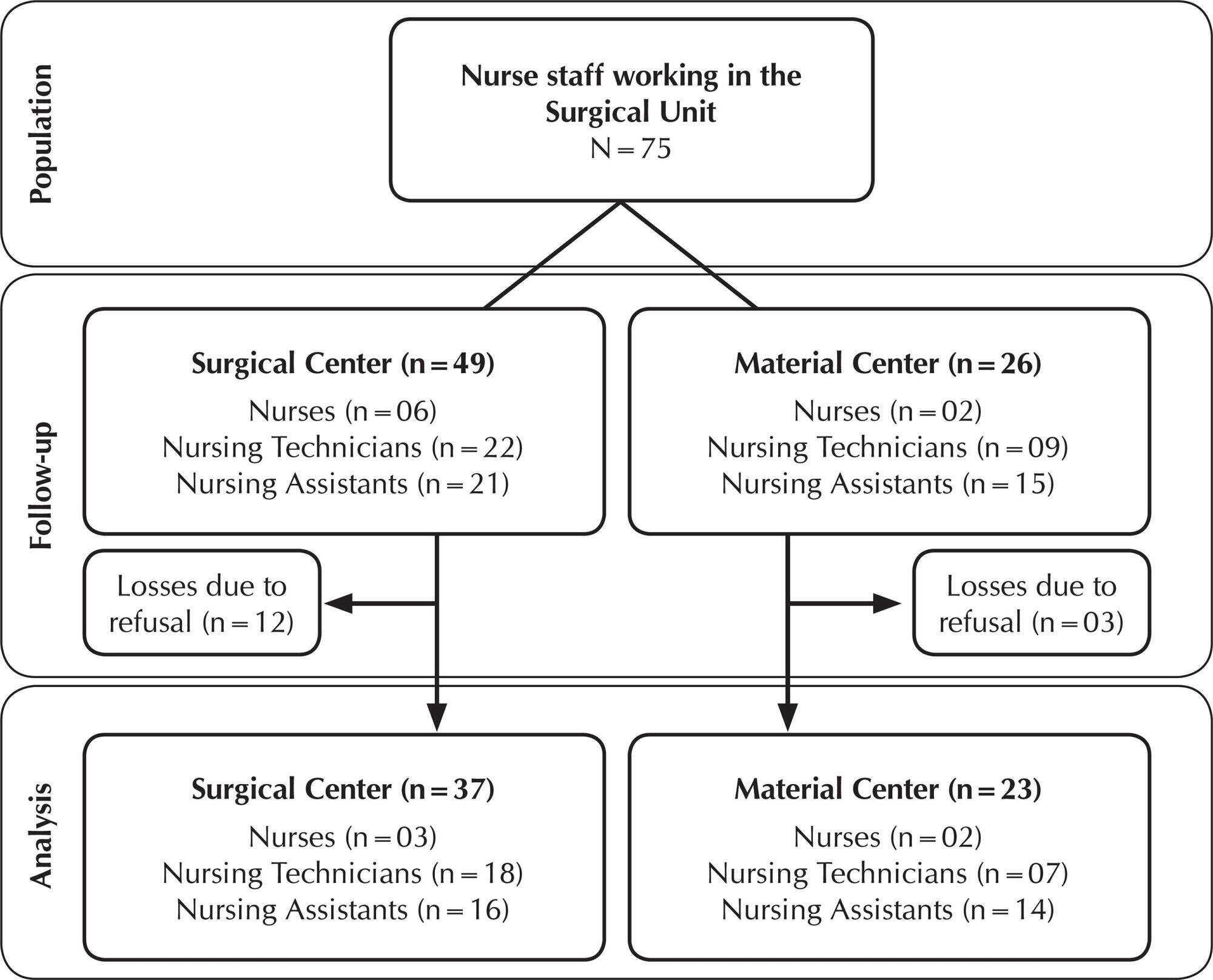
-
RESEARCH01-01-2018
Characterization of users at risk of developing diabetes: a cross-sectional study
Revista Brasileira de Enfermagem. 2018;71:475-482
Abstract
RESEARCHCharacterization of users at risk of developing diabetes: a cross-sectional study
Revista Brasileira de Enfermagem. 2018;71:475-482
DOI 10.1590/0034-7167-2017-0776
Views0See moreABSTRACT
Objective:
To characterize the profile of users at risk of developing diabetes mellitus type 2 according to sociodemographic and clinical variables.
Method:
Cross-sectional study, descriptive, quantitative approach conducted with 266 users of Basic Care. Inferential statistics analysis, calculating the crude prevalence ratio with confidence interval of 95% and Kruskal-Wallis test, and application of the multivariate technique simple Correspondence Analysis.
Results:
It was noted that 83.1% were women and 36.4% frequented the Family Health Unit from 1 to 5 years. Regarding the factors associated with diabetes mellitus type 2, 66.5% of the users were overweight and 77.9% were rated with central obesity. The great majority, 77.4%, did not practice physical activities and 21.1% had altered glycemia.
Conclusion:
The results showed that many risk factors for developing diabetes mellitus type 2 were among the population of the study.
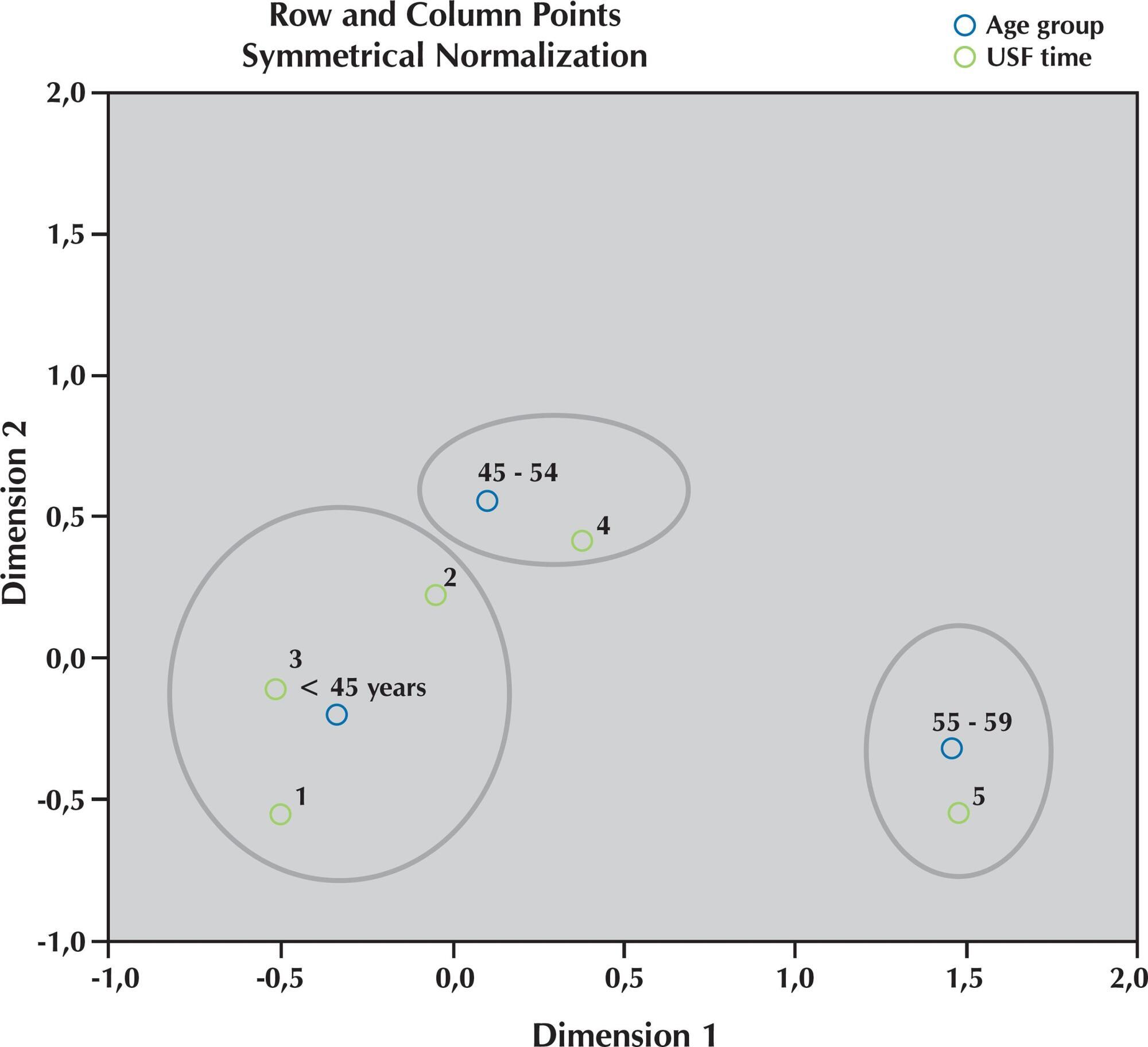
-
ORIGINAL ARTICLE09-16-2019
Validation of educational booklet: an educational technology in dengue prevention
Revista Brasileira de Enfermagem. 2019;72(5):1318-1325
Abstract
ORIGINAL ARTICLEValidation of educational booklet: an educational technology in dengue prevention
Revista Brasileira de Enfermagem. 2019;72(5):1318-1325
DOI 10.1590/0034-7167-2018-0771
Views0See moreABSTRACT
Objective:
to validate a booklet on dengue prevention in order to make it an educational technology to be used with the population.
Method:
methodological study, carried out with two groups of judges specialized in health and other areas. For data analysis, the calculation of Content Validity Index was carried out.
Results:
the booklet, in general, was considered valid by the expert judges, since it obtained an overall CVI of 70%. However, it has undergone a textual and aesthetic re-elaboration. The changes were based on the substitution of expressions, phrases, information additions and language adequacy. The illustrations were redone, adding clarity, expressiveness, movement, interaction and contextualization.
Conclusion:
the booklet is valid to be used for the population, with the purpose of informing, in a playful way, the forms of prevention and combat to mosquito transmitting dengue.

-
REVIEW09-18-2020
Mental health of healthcare professionals in China during the new coronavirus pandemic: an integrative review
Revista Brasileira de Enfermagem. 2020;73:e20200338
Abstract
REVIEWMental health of healthcare professionals in China during the new coronavirus pandemic: an integrative review
Revista Brasileira de Enfermagem. 2020;73:e20200338
DOI 10.1590/0034-7167-2020-0338
Views0See moreABSTRACT
Objective:
to identify publishing related to the mental health of health professionals working in the front line of the COVID-19 pandemic.
Methods:
an integrative review that included primary articles indexed in the Latin American and Caribbean Literature in Health Sciences, Medical Literature Analysis and Retrieval System Online, Cumulative Index to Nursing and Allied Health Literature, Scopus, Embase, Web of Science, Science Direct databases and US National Library of Medicine databases. The result analysis was performed descriptively, in four analytical categories.
Results:
The publishing involved aspects related to insufficient personal protective equipment, feelings of fear and stigma, the need for psychological and psychiatric support and the possibility of post-outbreak mental disorders.
Conclusion:
All mentioned aspects have a direct impact on the mental health of professionals, demanding the creation of strategies that minimize the emotional burnout of workers, considering that each country and culture reacts differently to the disease.

-
ORIGINAL ARTICLE06-27-2019
Religious/spiritual coping and level of hope in patients with cancer in chemotherapy
Revista Brasileira de Enfermagem. 2019;72(3):640-645
Abstract
ORIGINAL ARTICLEReligious/spiritual coping and level of hope in patients with cancer in chemotherapy
Revista Brasileira de Enfermagem. 2019;72(3):640-645
DOI 10.1590/0034-7167-2018-0358
Views0See moreABSTRACT
Aim:
To demonstrate the relationship between religious/spiritual coping and hope in cancer patients undergoing chemotherapy.
Method:
This is a cross-sectional, descriptive study with a quantitative approach performed in a reference outpatient clinic in Caruaru, PE, between August and October 2017. A total of 82 cancer patients undergoing chemotherapy were included in the study, using the brief religious/spiritual coping scale (RCOPE-Brief) and the Herth Hope Scale (HHS).
Results:
The sample presented mean positive RCOPE scores (3.03 ± 0.41) and the level of hope was considered high (42.7 points ± 3.67). Patients who had a high RCOPE score were found to have a higher mean of Herth’s level of hope (44.12 points).
Conclusion:
This study becomes relevant to nursing professionals by encouraging care that takes into account the patient’s spiritual dimension in order to stimulate positive mechanisms of religious coping and, consequently, raise the levels of hope.
-
ORIGINAL ARTICLE04-22-2020
Construction and validation of an educational booklet on care for children with gastrostomy
Revista Brasileira de Enfermagem. 2020;73(3):e20190108
Abstract
ORIGINAL ARTICLEConstruction and validation of an educational booklet on care for children with gastrostomy
Revista Brasileira de Enfermagem. 2020;73(3):e20190108
DOI 10.1590/0034-7167-2019-0108
Views0See moreABSTRACT
Objectives:
to describe the process of construction and validation of an educational booklet on care for children with gastrostomy, directed to caregivers.
Methods:
a methodological study developed in five stages: bibliographic survey; situational diagnosis; illustration, layout, design and text construction; expert validation and Flesch-Kincaid Readability calculation; validation with the target audience. Content Validity Index and Suitability Assessment of Materials were applied for expert analysis.
Results:
the Content Validity Index obtained overall score of 0.93. In the Suitability Assessment of Materials score, the booklet scored 85.2%. It presented a satisfactory readability percentage, with an overall score of 72%, and was consistent with caregivers’ assessment in the validation with the target audience, considering the explanatory technology, important and adequate.
Conclusions:
the developed educational booklet was considered valid for use by caregivers, thus contributing to the maintenance of best practices in care for children with gastrostomy.
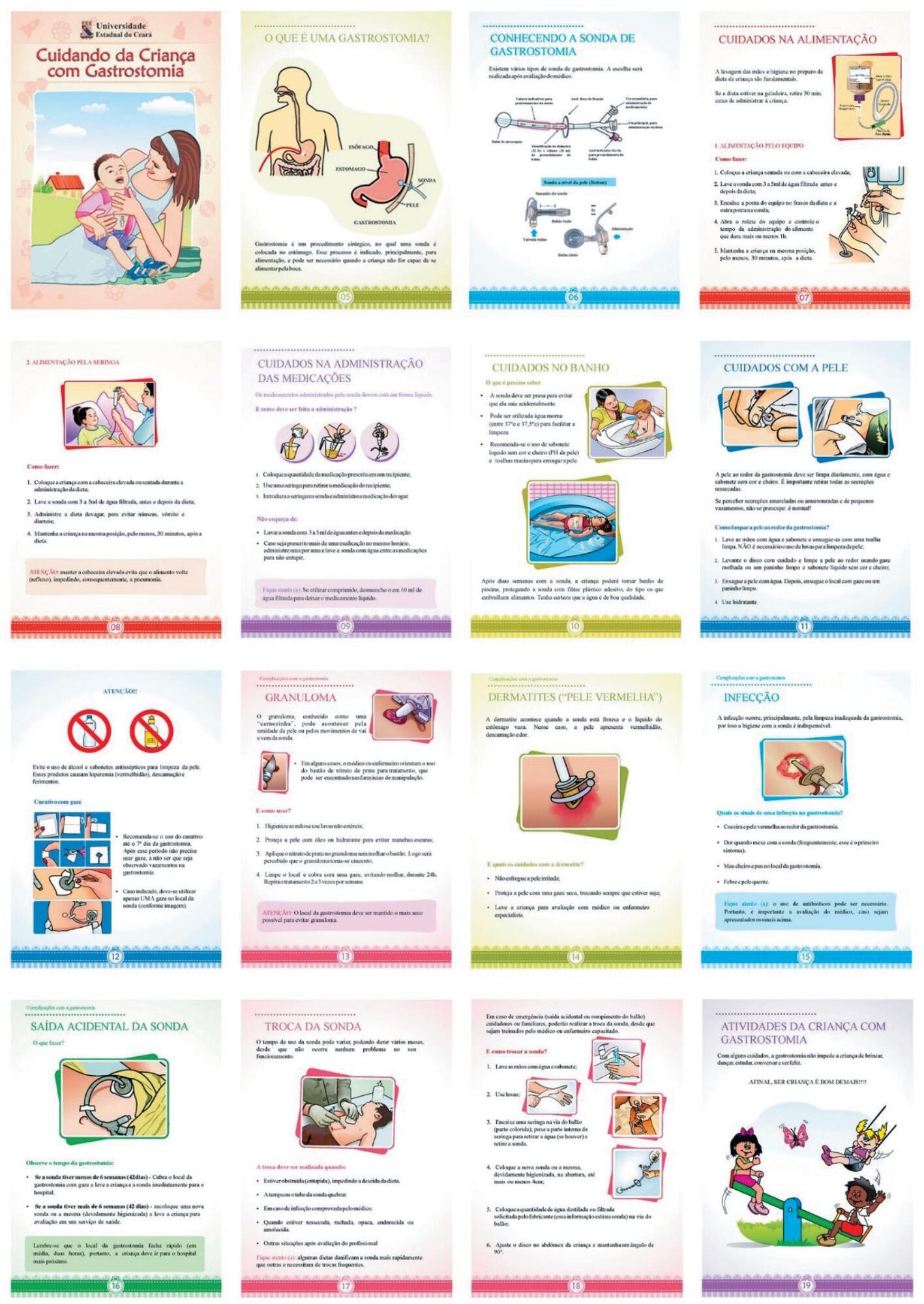
-
REVIEW12-05-2019
Hospital transition care for the elderly: an integrative review
Revista Brasileira de Enfermagem. 2019;72:294-301
Abstract
REVIEWHospital transition care for the elderly: an integrative review
Revista Brasileira de Enfermagem. 2019;72:294-301
DOI 10.1590/0034-7167-2018-0286
Views0See moreABSTRACT
Objective:
to identify evidence of scientific production on hospital transition care provided to the elderly.
Method:
an integrative review, with publications search in the MEDLINE, PubMed, LILACS, BDENF, Index Psychology and SciELO databases, with keywords and Mesh terms: elderly, hospitalization, patient discharge, health of the elderly, and transitional care, between 2013 and 2017 in English, Portuguese and Spanish. The 14 selected articles analysis was carried out through exploratory and critical reading of titles, abstracts and results of the researches.
Results:
transitional care can prevent re-hospitalizations as they enable rehabilitation, promotion and cure of illnesses in the elderly.
Final considerations:
transitional care implies the improvement of the quality of life of the elderly person, requiring skilled health professionals who involve the family through accessible communication.

-
ORIGINAL ARTICLE12-21-2020
Development of an appearance validity instrument for educational technology in health
Revista Brasileira de Enfermagem. 2020;73:e20190559
Abstract
ORIGINAL ARTICLEDevelopment of an appearance validity instrument for educational technology in health
Revista Brasileira de Enfermagem. 2020;73:e20190559
DOI 10.1590/0034-7167-2019-0559
Views1ABSTRACT
Objectives:
to develop and evaluate the convergence of the instrument for the appearance validity of educational technologies in health.
Methods:
methodological study conducted in two steps. In step 1, the instrument items were developed, with subsequent content validity by nine specialists in the development of educational technologies in health. In step 2, the convergent validity between another instrument and the appearance instrument was performed. Correlation results above r> 0.3 and p <0.05 were considered as plausible convergent validity.
Results:
the ten items of the initial version of the appearance instrument were submitted to content validity that resulted in a final version with 12 items (Content Validity Index = 0.93). The correlation indexes were strong with the objective and appearance domains; moderate with motivation, organization and total; and weak with writing style.
Conclusions:
the appearance instrument demonstrated content validity and convergent validity, in addition to a strong correlation with the other instrument.
Keywords:Educational TechnologyHealth EducationMethodological Research in NursingTechnological DevelopmentValidation StudiesSee more -
ORIGINAL ARTICLE02-10-2020
Burnout among nursing students: predictors and association with empathy and self-efficacy
Revista Brasileira de Enfermagem. 2020;73(1):e20180280
Abstract
ORIGINAL ARTICLEBurnout among nursing students: predictors and association with empathy and self-efficacy
Revista Brasileira de Enfermagem. 2020;73(1):e20180280
DOI 10.1590/0034-7167-2018-0280
Views0See moreABSTRACT
Objective:
to analyze burnout, its predictors and association with empathy and self-efficacy among nursing students.
Method:
cross-sectional analytical study with 284 students from five state universities in the state of Parana, Brazil. The instruments applied were: social and academic questionnaire, Maslach Burnout Inventory, Interpersonal Reactivity Index and Occupational Self-Efficacy Scale (Short Form). Spearman’s correlation and univariate and multivariate logistic analysis were used.
Results:
6.0% of the students presented high burnout, 36.3% presented high emotional exhaustion, 37.7% presented high depersonalization and 28.2% presented low personal accomplishment. The burnout predictors were: absence of physical activity; weekly workload >24 hours; low empathic concern. There were negative correlations between empathy (empathic concern and perspective taking) and depersonalization; self-efficacy and emotional exhaustion; and positive correlations between personal accomplishment and empathy and self-efficacy.
Conclusion:
Personal factors and an academic variable were burnout predictors among nursing students. The correlations suggest that self-efficacy and empathy can prevent burnout.
-
REVIEW08-07-2020
Positive aspects of authentic leadership in nursing work: integrative review
Revista Brasileira de Enfermagem. 2020;73(6):e20190118
Abstract
REVIEWPositive aspects of authentic leadership in nursing work: integrative review
Revista Brasileira de Enfermagem. 2020;73(6):e20190118
DOI 10.1590/0034-7167-2019-0118
Views0See moreABSTRACT
Objective:
To identify and analyze the existing scientific production on the positive aspects of authentic leadership in the nurse’s work process.
Method:
This is an integrative literature review. The databases used were Scientific Electronic Library Online; Latin American and Caribbean Literature on Health Sciences; and National Library of Medicine – National Institutes of Health.
Results:
In this study, 17 articles were selected for analysis; 1 study (6%) was published in a national journal, and 16 (94%) were international studies. Of the 17 (100%) articles studied, 11 (65%) were developed in Canada. The hospital environment was present in the 17 (100%) articles.
Final considerations:
Authentic leadership has several positive aspects that significantly influence the nurse’s work process, such as engagement and job satisfaction, retention of new nurses, organizational commitment, among others.
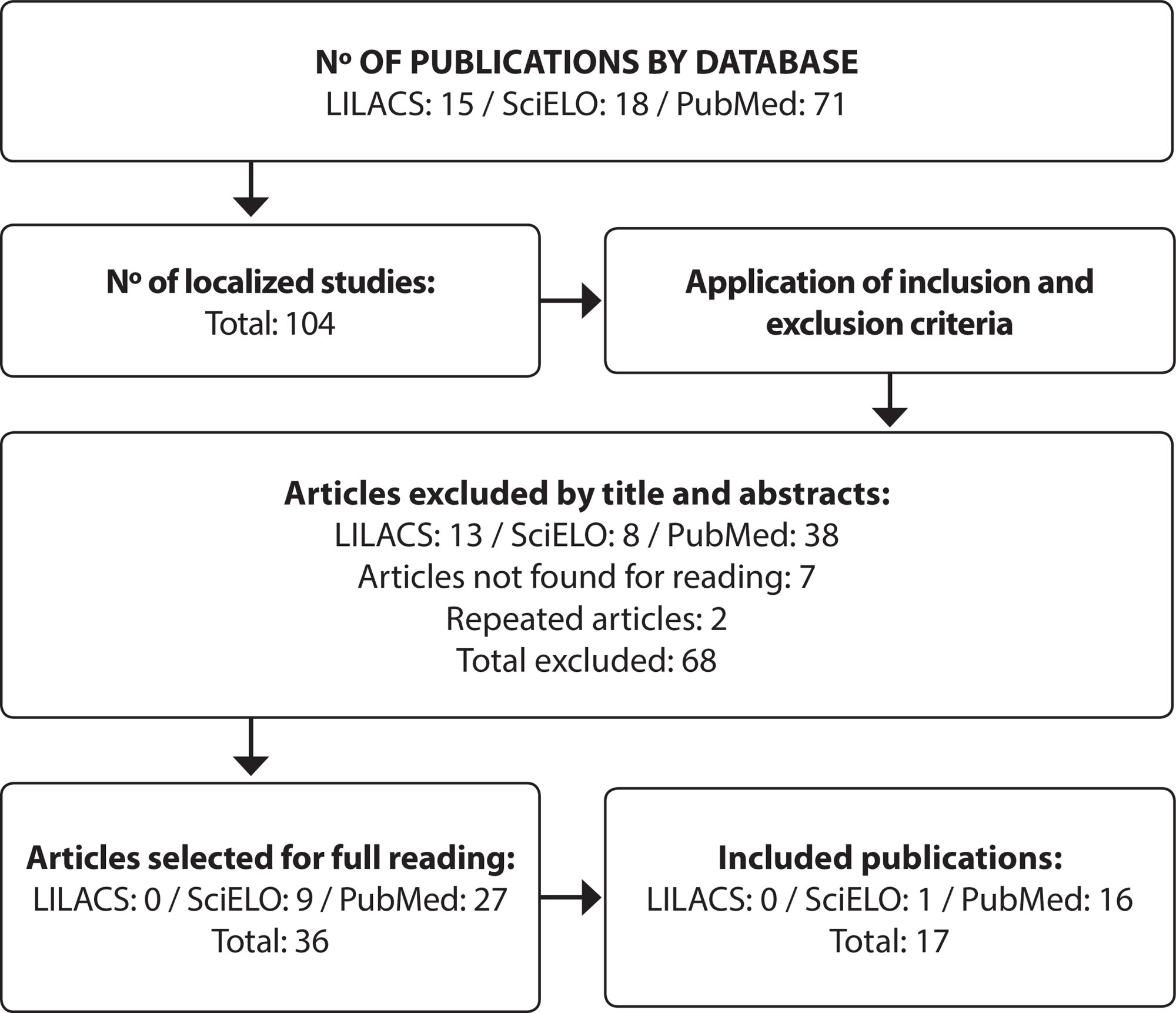
Search
Search in:
Nuvem de Tags
Aged (144) Atenção Primária à Saúde (239) COVID-19 (104) Cuidados de Enfermagem (269) Educação em Enfermagem (151) Educação em Saúde (139) Enfermagem (930) Estudos de Validação (131) Health Education (144) Idoso (208) Mental Health (149) Nursing (987) Nursing Care (306) Patient Safety (151) Primary Health Care (284) Qualidade de Vida (104) Quality of Life (106) Saúde Mental (145) Segurança do Paciente (150) Validation Studies (108)




